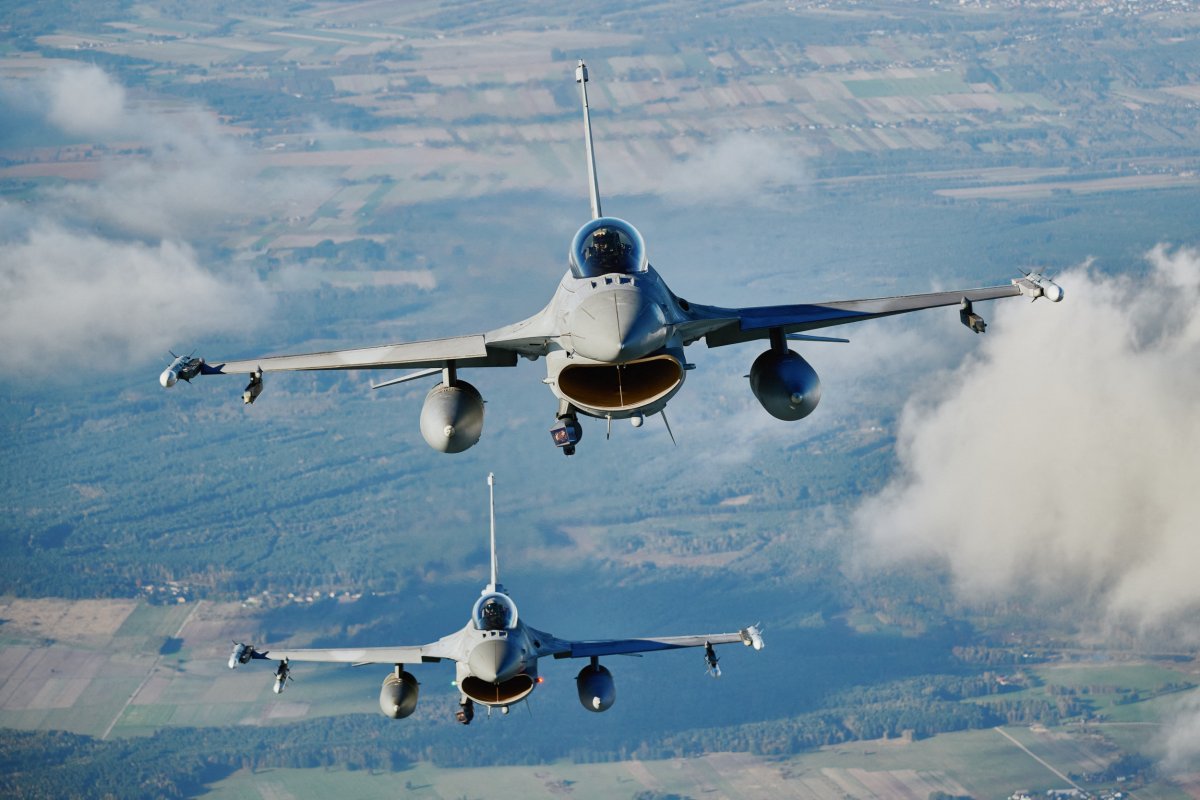NATO aircraft were scrambled after Russia launched large-scale missile strikes on Ukraine overnight on Thursday.
Poland's military announced that "intense long-range aviation activity of the Russian Federation is being observed, related to missile strikes" in Ukraine.
Writing on X, formerly Twitter, the Polish Armed Forces added: "Please note that Polish and allied aircraft operate in the airspace, which may result in increased noise levels, especially in the southeastern part of the country.
"All necessary procedures to ensure the safety of Polish airspace have been launched, and DO RSZ is monitoring the situation on an ongoing basis."

Newsweek has contacted the Polish Armed Forces for comment.
Russia launched a major missile and drone strike on Ukrainian energy infrastructure on Thursday morning, causing power cuts for at least 200,000 people, according to Kyiv officials.
Ukraine's energy ministry announced on Telegram that Russia had attacked energy infrastructure in the Kharkiv, Zaporizhzhia, Lviv, Kyiv and Odesa regions with drones and missiles.
It said: "In Odesa and Zaporizhzhia regions, equipment was damaged at high-voltage substations as a result of the attack. In the Lviv, Kharkiv, and Kyiv regions, equipment at electricity generation facilities was turned off during the air strike. In addition, the enemy attacked a gas infrastructure facility in Lviv region. No casualties."
Oleksiy Kuleba, the deputy head of the president's office, said that at least 10 rocket strikes had hit the Kharkiv region alone.
"The terrorist country is trying to destroy Kharkiv's infrastructure and leave the city in darkness," he wrote on Telegram. "Currently, there are already power outages in the region — more than 200,000 subscribers in the Kharkiv region are left without power supply."
Ukraine's Ministry of Defense announced that Russia attacked Ukraine's energy infrastructure overnight with 40 Shahed UAVs and 42 missiles of various types.
It added that Ukrainian air defense shot down 57 aerial targets, including 39 Shahed UAVs, 16 Kh-101 cruise missiles and two Kh-59 guided air missiles.
In response to the strikes, Ukrainian President Volodymyr Zelensky said: "Overnight, Russia fired more than forty missiles and about forty drones at Ukraine.... Some missiles and 'Shahed' drones were successfully shot down. Unfortunately, only a part of them. Russian terrorists have once again targeted critical infrastructure.
Overnight, Russia fired more than forty missiles and about forty drones at Ukraine.
— Volodymyr Zelenskyy / Володимир Зеленський (@ZelenskyyUa) April 11, 2024
I thank everyone engaged in recovery efforts after the attack, as well as to every warrior of our air defense system who was on guard last night.
Some missiles and "Shahed" drones were… pic.twitter.com/Oxk78LTVj6
"All of our European neighbors and other partners see Ukraine's critical need for air defense systems. Right now, with our ability to overcome Russian terror, the world can demonstrate that all terror is treated equally as a crime. However, if Russia is allowed to continue doing so, if Russian missiles and 'Shahed' drones continue to strike not only Ukraine but also the resolve of our allies, this will amount to a global license for terror.
"We need air defense systems and other defense assistance, not just turning a blind eye and having lengthy discussions."
It comes after German fighter aircraft were scrambled to intercept a Russian reconnaissance aircraft over the Baltic Sea on Tuesday.
A-Scramble - Einsatz unserer Alarmrotte des Taktischen Luftwaffengeschwaders 71 „Richthofen“ aus Laage raus. Zusammen mit unseren 🇸🇪 Partnern überprüften wir eine 🇷🇺 Aufklärungsmaschine auf Höhe Gotland.⁰#StrongerTogether @NATO_AIRCOM @NATO @GermanyNATO pic.twitter.com/WOLpv7Uw5e
— Team Luftwaffe (@Team_Luftwaffe) April 9, 2024
Swedish forces spotted the Russian Il-20 aircraft after it flew into Sweden's "identification zone," southeast of the county of Blekinge, close to the strategic island of Gotland. Two Luftwaffe Eurofighters scrambled to intercept it, flying out of an air base close to the German town of Laage.
"Together with our [Swedish] partners we checked a [Russian] reconnaissance aircraft at Gotland," the German Air Force wrote in a post on X.
Uncommon Knowledge
Newsweek is committed to challenging conventional wisdom and finding connections in the search for common ground.
Newsweek is committed to challenging conventional wisdom and finding connections in the search for common ground.
About the writer
Matthew Robinson is the Newsweek U.S. News Editor based in London, U.K. His focus is U.S. politics and national news. ... Read more
To read how Newsweek uses AI as a newsroom tool, Click here.








